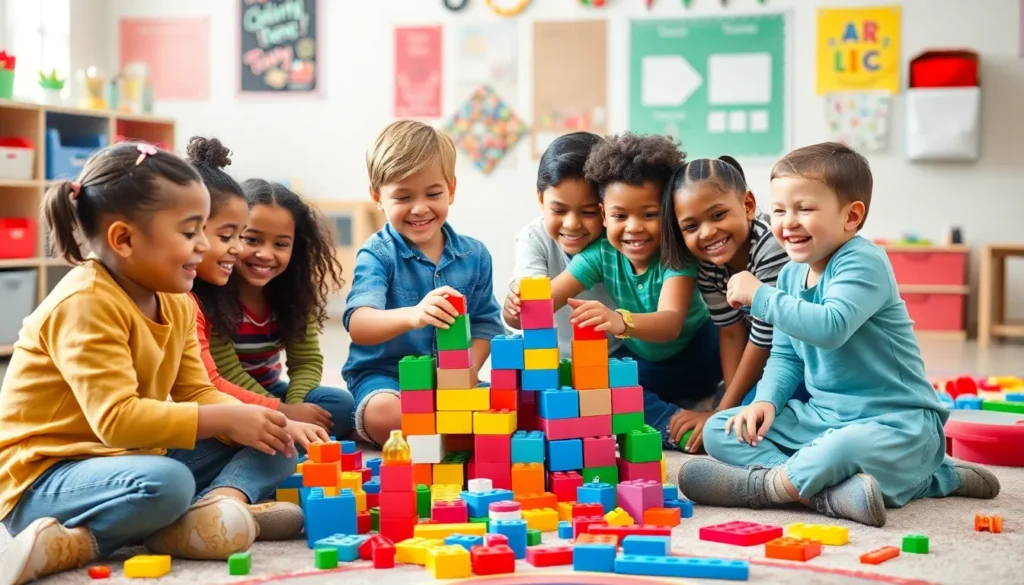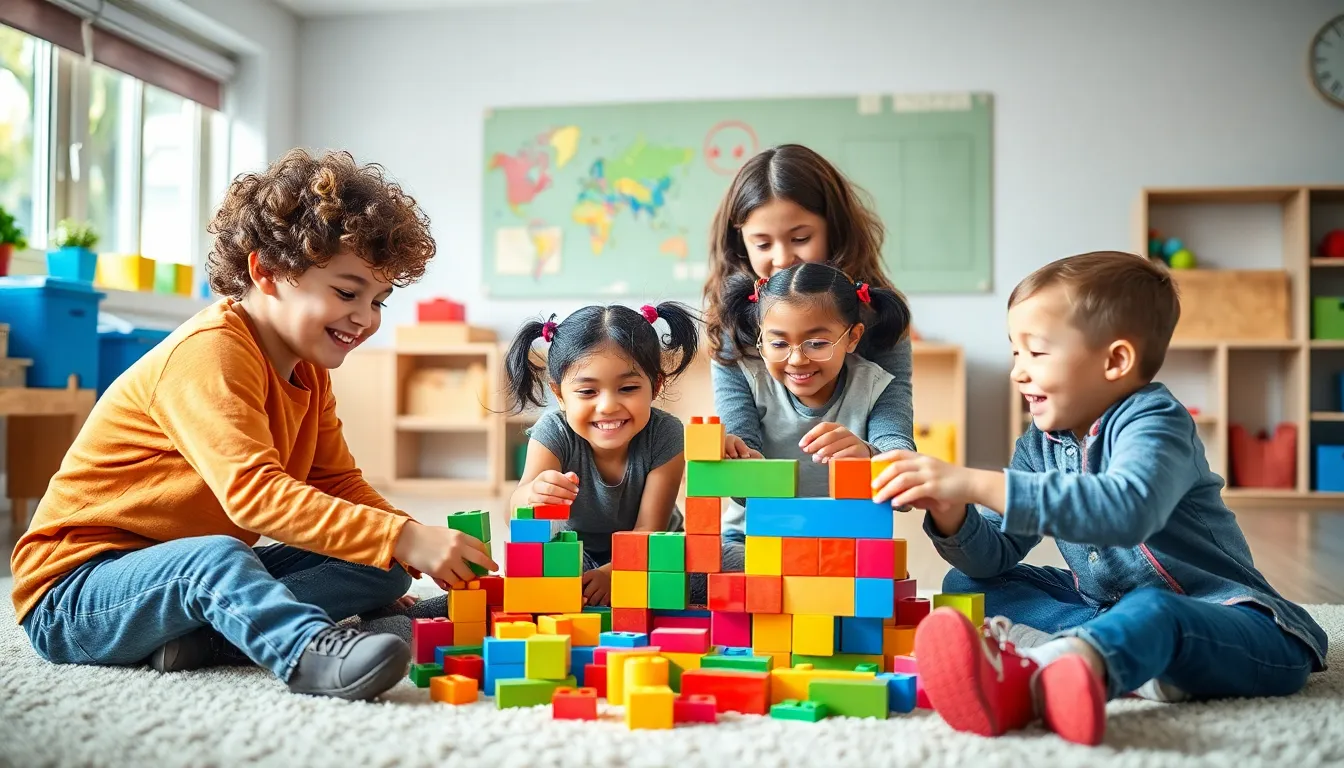Table of Contents
TogglePlaytime isn’t just for kids; it’s a secret weapon for learning! Imagine a world where building blocks turn into math lessons and pretend kitchens spark culinary creativity. Learning through play transforms everyday activities into powerful educational experiences, making knowledge stick like peanut butter on a roof of your mouth.
Understanding Learning Through Play
Learning through play encompasses various activities where children engage and explore, enhancing their cognitive and social skills. It transforms simple moments into meaningful learning experiences, solidifying concepts children encounter in structured education.
Definition and Importance
Learning through play refers to the process where children acquire knowledge and skills through playful activities. It promotes critical thinking, fosters creativity, and encourages collaboration among peers. Engaging in play stimulates curiosity, making lessons enjoyable and impactful. Kids develop problem-solving abilities and social skills while participating in games or imaginative scenarios. Research suggests that this approach not only hones academic understanding but also supports emotional development, reinforcing resilience and adaptability.
Historical Context
Historically, the concept of learning through play has roots in early childhood education. Influential figures like Friedrich Froebel and Maria Montessori championed play as a vital component of learning. Froebel introduced the idea of “kindergarten,” emphasizing that play is essential for young children’s development. Montessori’s educational approach also highlights hands-on learning experiences. Over time, modern educational frameworks have increasingly recognized the value of integrating play into learning environments. This acknowledgment reflects a shift in pedagogy, embracing play as an essential element for holistic child development.
Benefits of Learning Through Play
Learning through play offers numerous advantages, particularly in cognitive and social skill development.
Cognitive Development
Playful activities stimulate children’s minds and foster critical thinking. Engaging in games that require problem-solving enhances reasoning abilities. Building blocks teaches math concepts like measurements and spatial awareness. Participating in role-playing scenarios encourages creativity and imaginative thinking. Research indicates that hands-on experiences promote better retention of information. The process allows kids to make connections between their activities and real-life situations. Educational playgroups also provide a platform for collaborative learning, contributing to a deeper understanding of concepts.
Social Skills Enhancement
Social interaction during play builds essential interpersonal skills. Children learn to share, negotiate, and resolve conflicts through group activities. Engaging in collaborative games fosters teamwork and communication. They also develop empathy by understanding different perspectives during role-play. Active participation in pretend scenarios allows for exploration of social norms and behaviors. Observation of peers further reinforces learning about cooperation and respect. Structured playtime provides an environment where children practice and refine their social skills in a safe space.
Different Approaches to Learning Through Play
Learning through play encompasses varied approaches that significantly impact children’s development. Two primary forms, structured play and unstructured play, serve distinct educational purposes.
Structured Play
Structured play involves organized activities with specific objectives. Educators often design games or tasks that focus on skill-building in areas like math, literacy, or teamwork. For instance, a scavenger hunt can develop problem-solving skills, while group games encourage cooperation and communication. Rules and frameworks guide children, helping them understand boundaries while still promoting creativity. Research shows structured play can yield measurable benefits in cognitive skills, particularly when integrated into the curriculum. Teachers can assess learning outcomes, ensuring that children develop necessary competencies through engaging exercises.
Unstructured Play
Unstructured play allows for spontaneous exploration and creativity. Children freely choose activities, fostering self-direction and independence. This type of play encourages experimentation, where kids learn through trial-and-error without predefined rules. For example, outdoor play invites children to create games or build structures, enhancing imaginative thinking. Benefits include improved social skills, as kids negotiate roles and resolve conflicts organically. Studies reflect that unstructured play significantly contributes to emotional and social development, offering essential life lessons in a relaxed environment. The flexibility of unstructured play nurtures individual interests and inspires curiosity about the world.
Challenges and Considerations
Learning through play faces several challenges and considerations that educators and caregivers must navigate. Balancing play and academic goals is crucial for effective learning.
Balancing Play and Academic Goals
Finding the right mix between play and structured learning activities remains a challenge. Educators must ensure that play does not overshadow essential academic objectives. Incorporating educational elements into play experiences provides opportunities to achieve specific learning targets. Effective lesson plans combine playful methods with curriculum standards, allowing for meaningful learning moments. Research shows children retain information better when engaged in enjoyable activities. Such integration helps foster an environment where children can thrive both socially and academically.
Addressing Diverse Needs
Recognizing diverse needs among children is essential in a learning-through-play context. Every child possesses unique strengths, interests, and learning styles. Educators must adapt play activities to cater to various developmental levels and cultural backgrounds. Implementing inclusive strategies enhances engagement for all students. Consideration of individual differences promotes a sense of belonging, allowing every child to participate meaningfully. Tailored approaches not only support individual growth but also improve overall classroom dynamics.
Conclusion
Embracing learning through play is essential for fostering children’s development. It enriches their cognitive and social skills while making education enjoyable and engaging. By blending structured and unstructured play, educators can create a balanced environment that nurtures creativity and critical thinking.
Recognizing the unique needs of each child ensures that play remains inclusive and impactful. As society continues to evolve, the emphasis on play as a core component of learning will only grow stronger. Prioritizing play in educational settings will not only enhance academic outcomes but also cultivate well-rounded individuals ready to navigate the complexities of life.








